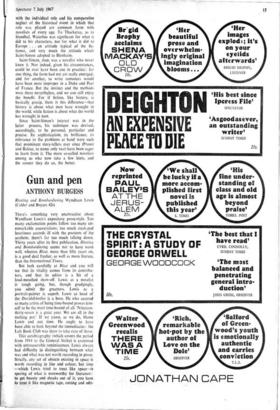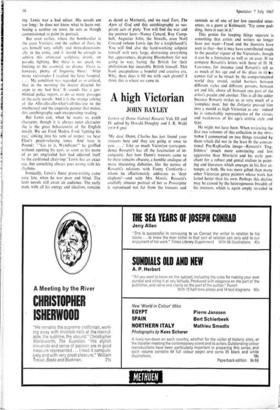Gun and pen
ANTHONY BURGESS
There's something very unattractive about Wyndham Lewis's expository prose-style. Too many exclamation points follow too many un- remarkable asseverations; too much steak-pud heartiness accords ill with the postures of the aesthete; there's far too much talking down. Thirty years after its first publication, Blasting and Bornbardiering seems not to have worn well, whereas Blast, more than fifty years on, is a good deal fresher, as well .as more literate, than the International Times.
But look carefully at Blast and you will see that its vitality comes from its contribu- tors, and that its editor is a bit of a loud-mouthed show-off. Lewis as a novelist is tough going, but, though grudgingly, you admit the greatness. Lewis as a portrait-painter is superb. Lewis as head of the Davidsbiindler is a bore. He who accused so many artists of being time-bound proves him- self to be the most time-bound of all. 'Nineteen- thirty-seven is a great year. We are all in the melting pot.' If we yawn, as we do, blame Lewis and not time. He ought to have been able to look beyond the immediacies: the Left Book Club was there to take care of those.
This autobiography (which covers the period from 1914 to the General Strike) is crammed with untreasurable reminiscences. Lewis always had difficulty in distinguishing between what was and what was not worth recording in prose. Strictly, any set of objects existing in space is worth recording in line and colour, but time —which Lewis tried to treat like •space—is sparing of what is noteworthy for literature: to get beauty and shocks out of it, you have to treat it like magnetic tape, cutting and edit-
ing. Lewis was a bad editor. His novels are too long: he does not know what to leave out. Seeing a sardine on toast, he acts as though commissioned to paint its portrait.
But even earlier, where the bombardier is the great Vorticist and the author of Tarr, he sets himself very solidly and three-dimension- ally in the army, and it should be enough to admire this animated sculpture. drunk, on parade, fighting. But there is no :peed, no limiting to the essential, no drama. There is, however, plenty of linguistic bloat: 'After many vicissitudes I reached the fever hospital. . . . My condition was regarded as so critical, that in the morning the doctor directed his steps to my bed first.' It sounds like a gor- blimied police report, as do so many passages in the early novels. And it is the strange yoking of the Allo-allo-allo-what's-all-this-'ere to the intellectual and the exquisite painter that makes this autobiography such exasperating reading.
But Lewis can, when he wants to, catch character, though it is always outer character the is the great behaviourist of the English novel). We see Ford Madox Ford lighting his eye,' sinking into his tank of torpor; we hear Eliot's peach-refusing tones. And here is Pound: ' "Go to it, Wyndham!" he gruffled without opening his eyes, as soon as his mane of as yet ungrizzled hair had adjusted itself to the cushioned chair-top.' Lewis. has an exact eye, but something always goes wrong with his rhythms.
Ironically, Lewis's finest prose-writing came very late, when he was poor and blind. The later novels still await an audience. The early man, with all his energy and idealism, remains
as dated as Marinetti, and we read Tarr, The Apes of God and this autobiography as sus- pirant acts of piety. You will find the war and the postwar here—Nancy Cunard, Roy Camp- bell, Augustus John, the Sitwells, even Noel Coward (whom Lewis tips for a knighthood!). You will find also the hard-working solipsist himself writ very large, distrusting everything but appearances, despising Bloomsbury for not going to war, hating the British for their philistinism but incurably British himself. This book encapsulates a hopeful and creative era. Why. then, does it till me with such gloom? I think this is where we came in.







































 Previous page
Previous page